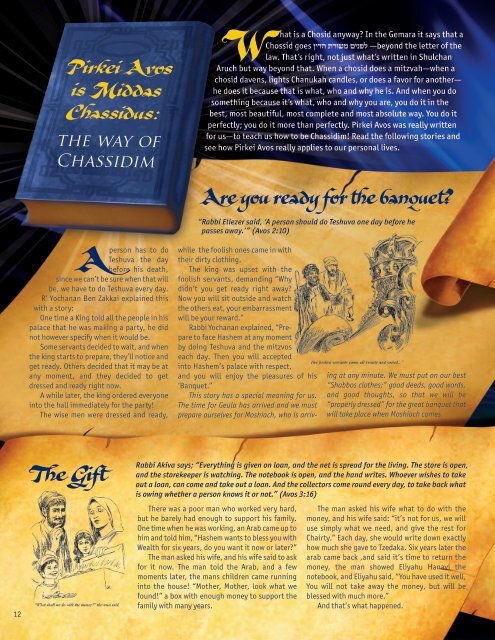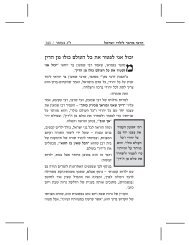You also want an ePaper? Increase the reach of your titles
YUMPU automatically turns print PDFs into web optimized ePapers that Google loves.
Pirkei Avos<br />
is Middas<br />
Chassidus:<br />
the way of<br />
Chassidim<br />
W<br />
hat is a Chosid anyway In the Gemara it says that a<br />
Chossid goes לפנים משורת הדין —beyond the letter of the<br />
law. That’s right, not just what’s written in Shulchan<br />
Aruch but way beyond that. When a chosid does a mitzvah—when a<br />
chosid davens, lights Chanukah candles, or does a favor for another—<br />
he does it because that is what, who and why he is. And when you do<br />
something because it’s what, who and why you are, you do it in the<br />
best, most beautiful, most complete and most absolute way. You do it<br />
perfectly; you do it more than perfectly. Pirkei Avos was really written<br />
for us—to teach us how to be Chassidim! Read the following stories and<br />
see how Pirkei Avos really applies to our personal lives.<br />
Are you ready for the banquet<br />
“Rabbi Eliezer said, ‘A person should do Teshuva one day before he<br />
passes away.’” (Avos 2:10)<br />
Aperson has to do<br />
Teshuva the day<br />
before his death,<br />
since we can’t be sure when that will<br />
be, we have to do Teshuva every day.<br />
R’ Yochanan Ben Zakkai explained this<br />
with a story:<br />
One time a King told all the people in his<br />
palace that he was making a party, he did<br />
not however specify when it would be.<br />
Some servants decided to wait, and when<br />
the king starts to prepare, they’ll notice and<br />
get ready. Others decided that it may be at<br />
any moment, and they decided to get<br />
dressed and ready right now.<br />
A while later, the king ordered everyone<br />
into the hall immediately for the party!<br />
The wise men were dressed and ready,<br />
while the foolish ones came in with<br />
their dirty clothing.<br />
The king was upset with the<br />
foolish servants, demanding “Why<br />
didn’t you get ready right away<br />
Now you will sit outside and watch<br />
the others eat, your embarrassment<br />
will be your reward.”<br />
Rabbi Yochanan explained, “Prepare<br />
to face Hashem at any moment<br />
by doing Teshuva and the mitzvos<br />
each day. Then you will accepted<br />
into Hashem’s palace with respect,<br />
and you will enjoy the pleasures of his<br />
‘Banquet.”<br />
This story has a special meaning for us.<br />
The time for Geula has arrived and we must<br />
prepare ourselves for Moshiach, who is arriving<br />
at any minute. We must put on our best<br />
“Shabbos clothes;” good deeds, good words,<br />
and good thoughts, so that we will be<br />
“properly dressed” for the great banquet that<br />
will take place when Moshiach comes.<br />
12<br />
The Gift<br />
Rabbi Akiva says; “Everything is given on loan, and the net is spread for the living. The store is open,<br />
and the storekeeper is watching. The notebook is open, and the hand writes. Whoever wishes to take<br />
out a loan, can come and take out a loan. And the collectors come round every day, to take back what<br />
is owing whether a person knows it or not.” (Avos 3:16)<br />
There was a poor man who worked very hard,<br />
but he barely had enough to support his family.<br />
One time when he was working, an Arab came up to<br />
him and told him, “Hashem wants to bless you with<br />
Wealth for six years, do you want it now or later”<br />
The man asked his wife, and his wife said to ask<br />
for it now. The man told the Arab, and a few<br />
moments later, the mans children came running<br />
into the house! “Mother, Mother, look what we<br />
found!” a box with enough money to support the<br />
family with many years.<br />
The man asked his wife what to do with the<br />
money, and his wife said: “it’s not for us, we will<br />
use simply what we need, and give the rest for<br />
Chairty.” Each day, she would write down exactly<br />
how much she gave to Tzedaka. Six years later the<br />
arab came back ,and said it’s time to return the<br />
money, the man showed Eliyahu Hanavi the<br />
notebook, and Eliyahu said, “You have used it well,<br />
You will not take away the money, but will be<br />
blessed with much more.”<br />
And that’s what happened.




